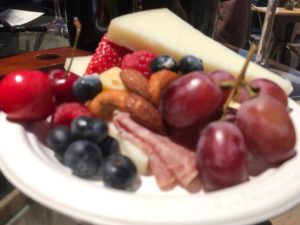There are many places where you can buy olive oil. But where do you find the best one? And how do you know if you should buy a virgin olive oil, an extra-virgin or a refined olive oil?
So before telling you where, let’s find out how olive oil is made and what is the best one to buy.
In Provence, harvesting the olives normally takes place around November.
Using traditional methods, this will be done by hitting the olive branches with long sticks, thereby forcing the ripe fruit to tumble onto nets spread on the ground beneath the tree.
After harvesting, olives must be taken to the mill for processing as quickly as possible – within 3 days to get the AOC (Apellation d’Origine Contrôlée, which is a label of quality from France). Leaves and twigs are removed, the fruit washed, then the olives – pits included – are ground into a paste … using huge millstones.
Yes, the pit is included because it contains a anti-oxydant that will preserve the oil. No preservatives are added to the oil.
A first centrifuge at 4000 rpm will separate the solid (skin, pit) from the liquid (water an oil) and a 7,500rpm centrifuge will then separate the water from the oil.
The best quality oil is made from the “first cold press”. In other words, it must be derived from the first pressing of the olives. And cold pressed olive oil means the olive paste must be kept under 27C (80F) for, if too much heat is used, the oil chemistry will change.
- Extra-virgin olive oil (EVOO) comes from virgin oil production only, contains no more than 0.8% acidity, and is judged to have a superior taste. Extra Virgin olive oil accounts for less than 10% of oil in many producing countries. It is used on salads, added at the table to soups and stews and for dipping.
- Virgin olive oil comes from virgin oil production only, has an acidity less than 2%, and is judged to have a good taste.
- Pure olive oil. Oils labeled as Pure olive oil or Olive oil are usually a blend of refined and virgin production oil.
- Olive oil is a blend of virgin and refined production oil, of no more than 1.5% acidity. It commonly lacks a strong flavor.
Now that we know we only want extra-virgin and virgin olive oil, where is the best one in Provence?
I am a tour guide and have visited many different places where olive oil is made. My favorite one is found at the “Clos des Jeannons” in Gordes, in the heart of Luberon in Provence. When I go there with my small groups of 8 people, Andre, the owner, gave us a tour in his olive fields, share with us his passion of olive making and then take us inside his farm to see the process of olive oil making. The tour ends with the tasting of the oils of course. One of his specialties is the truffle olive oil. The truffle or “black gold” is also a specialty of Provence but that will be the topic of another bog. Andre’s oil is so pure, your mouth can’t cheat you. My groups always end up buying a lot of his olive products.
Andre always invite us to picnic in his field and he brings us wine (French hospitality he says).
If you want to join us on one of our tours to Provence that includes a visit of this olive oil farm, visit frenchescapade.com

Jackie Grandchamps obtained her Ph.D. in Molecular Biology in Belgium, and then moved to the U.S. in 1995 to conduct cancer research at Stanford University in California. Her heart has always been in travel however, and she turned her passion into a full time job in 2003 when she launched her travel business, French Escapade offering an authentic travel experience to women.
She says, “I wanted to make my dream come true: sharing my love of traveling and giving people the opportunity to really experience a different culture. Instead of the traditional ‘tourist’ sightseeing trip to France, I wanted to immerse very small groups of women in the culture, let them meet locals, eat authentic cuisine and ‘live’ an authentic experience. That’s how French Escapade was born.”











